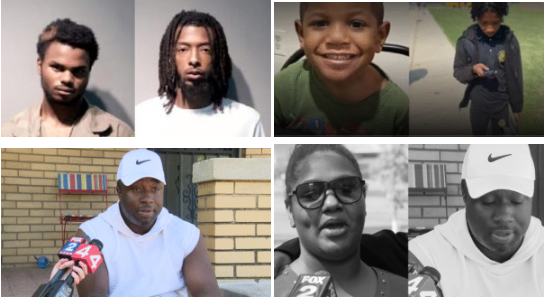DETROIT, MICHIGAN — The early evening of June 27, 2025, should have been an ordinary summer night in Detroit’s east side. Children played under the open sky at Skinner Playfield, a neighborhood park near Denby High School, while families gathered in the soft light. Among them was 4-year-old Samir Grubbs, enjoying the warmth of the season alongside his mother and siblings. Nearby, 18-year-old Daviyon Shelmonson-Bey had come to meet friends. Both had no connection to each other, nor any awareness of what would soon unfold. Before the sun could set, their lives would be claimed in a horrific drive-by shooting, and the city would be left grasping for answers.
Authorities now say two young men—Brandon Ware, 18, and William Wheeler, 19—are responsible for a calculated act of violence that left the community devastated. Both have been charged with two counts of first-degree murder, among other serious felonies. The alleged motive stems from a prior altercation earlier that day, which escalated into deadly retaliation. The randomness of the shooting, and the innocent lives lost, have turned this case into a symbol of Detroit’s ongoing struggle with gun violence.
The Wayne County Prosecutor’s Office made the charges public on Saturday, July 5. Speaking on behalf of the state, Prosecutor Kym Worthy described the incident as an “American tragedy.” Her words underscored the scope of devastation: “The pain of losing a 4-year-old to gunfire while playing in a neighborhood park is incalculable.”
The shooting took place following a confrontation on a city bus, where a passenger allegedly pulled a ski mask off Ware’s head. Police allege that Ware, incensed by the public humiliation, left the bus and coordinated with Wheeler to find and retaliate against those he believed were involved. Wheeler, authorities say, drove Ware in a pickup truck to Dutchess Street near Morang Avenue—directly beside Skinner Playfield.
There, Ware allegedly fired multiple rounds from the vehicle into the crowd at the park. According to investigators, none of the victims had any involvement in the earlier incident. This chilling misidentification cost two young people their lives.
Samir Grubbs, just four years old, was playing near the swings with his family. His short life ended abruptly in a setting meant to be safe and joyous. Shelmonson-Bey, 18, who had recently graduated high school and was said to be looking toward college, was unarmed and simply present at the wrong place at the wrong time. A third victim, a 17-year-old male whose name has not been released, was also shot and remains hospitalized.

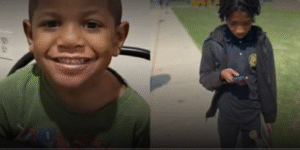
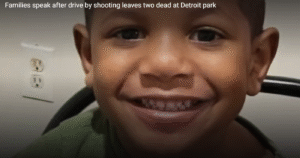
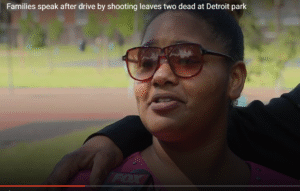
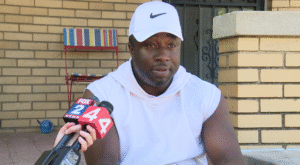
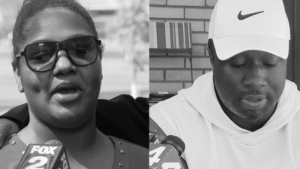
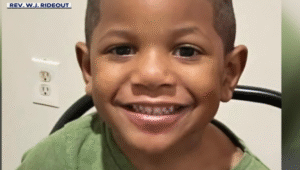
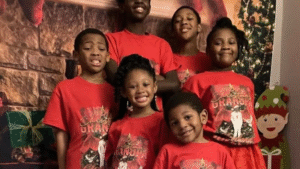
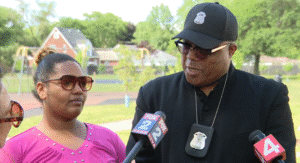
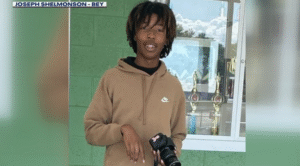
The shock of the crime reverberated immediately. Detroit police were called to the scene on reports of shots fired. Officers arrived to find the park in chaos. Victims were rushed to nearby hospitals, where Samir and Daviyon were pronounced dead.
The investigation that followed was led by the Detroit Police Department Homicide Unit. Through a combination of surveillance video, forensic analysis, and witness accounts, Ware and Wheeler were identified and taken into custody less than a week later. Both were arraigned Saturday and are being held without bond.
The charges brought against them are severe: two counts of first-degree murder, one count of assault with intent to murder, two counts of discharging a firearm from a vehicle causing death, one count of discharging a firearm from a vehicle causing serious injury, and five counts of felony firearm use. If convicted, they could face life imprisonment without the possibility of parole.
Community grief quickly followed official proceedings. Families of both victims spoke publicly, not only mourning the loss of their loved ones but also calling for an end to gun violence in their neighborhoods. Samir’s mother, who witnessed her son being shot, has not spoken directly to media but was quoted through relatives who described the unimaginable pain she endured. “He was on the swings. He was smiling,” said one relative. “We were just trying to have a normal day.”
Daviyon Shelmonson-Bey’s family described him as a kind and respectful young man with ambitions that now will never be realized. A cousin of his told reporters, “He wasn’t part of any drama. He didn’t deserve this. None of them did.”
Their statements have highlighted the senselessness of the shooting—a crime of vengeance that targeted no one responsible for the initial incident. The randomness is what continues to haunt many Detroit residents.
Detroit Police Chief James White praised the swift work of detectives but acknowledged the tragedy was emblematic of larger societal problems. “There are no winners here. Two young lives were taken, and two others are now facing the rest of their lives behind bars. Our entire community suffers from tragedies like this,” he stated.
This incident has once again brought attention to Detroit’s ongoing battle with youth gun violence. The summer of 2025, like many before it, has already seen a troubling uptick in shooting deaths, particularly involving juveniles. Though officials often cite progress in community policing and gun buyback programs, the root causes—poverty, lack of opportunity, and cycles of retaliatory violence—remain difficult to uproot.
Prosecutor Worthy noted the urgency of intervention beyond criminal proceedings. “We cannot arrest our way out of this,” she said, emphasizing the importance of early conflict resolution and youth engagement programs.
The shooting also casts a shadow over public trust in everyday spaces. Playgrounds, schoolyards, and parks are meant to be sanctuaries for children. When these places become crime scenes, the psychological toll extends far beyond the victims. The emptiness of Skinner Playfield in the days that followed, as families avoided it out of fear or grief, reflected that reality. A place once filled with laughter and games was transformed into a symbol of loss.
While legal proceedings are underway, community members have stepped in to provide support. A GoFundMe campaign has been launched to aid Samir’s family with funeral expenses and to provide counseling resources for his siblings. Similar efforts are expected for Daviyon’s family.
Funeral arrangements for both victims are pending. In the meantime, memorials are being planned in partnership with local faith leaders and youth advocates, aiming to honor the victims while calling for long-term change.
As Ware and Wheeler await their preliminary hearing, the city remains on edge, grappling with the aftermath of another tragedy rooted in misjudgment and rage. The Detroit Police Department has urged anyone with further information about the case to come forward and continue assisting in the investigation.
This story will remain a defining one in Detroit’s history—not just for the innocence lost, but for what it represents: a society at a crossroads, where the decisions of moments carry the weight of lifetimes, and where justice, however thorough, can never restore what has been taken away.

